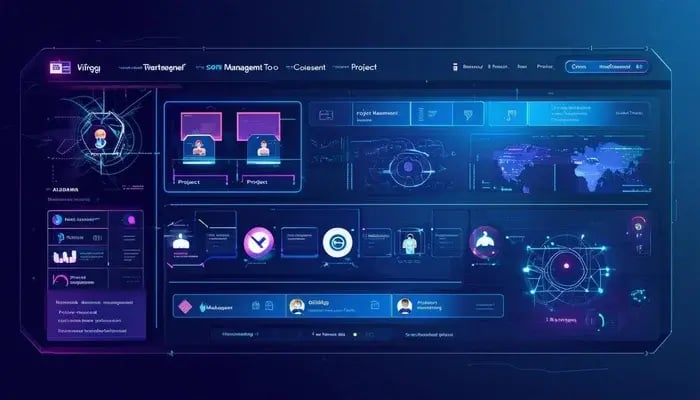Project Management AI Tools: Reduce Cyber Risks & Boost Collaboration
Date: 7 November 2024

As businesses increasingly incorporate artificial intelligence (AI) into their operations, project management stands out as one area that benefits significantly from these cutting-edge technologies. Recent surveys by McKinsey demonstrate an impressive transition, with 65% of organizations now regularly employing generative AI; up from just 12 months prior.
AI tools in project management not only facilitate increased collaboration but also strengthen cybersecurity measures by streamlining operations and safeguarding data. Project managers can now focus more on strategic decision-making than routine task management thanks to AI tools.
Let's examine where AI's impact has been most prominent in the project management landscape.
Strategic Use of AI Tools in Project Management
The adoption of AI technology in project management has significantly transformed the landscape, making operations more efficient and data-driven. These advanced tools enable managers to handle complex projects with greater agility and foresight, tailoring solutions to the specific dynamics and challenges of each task. However, finding the right solution can prove to be challenging.
When you're thinking about comparing different tools like Motion vs Notion, for example, it becomes clear that each tool serves distinct needs. Motion, with its AI-driven scheduling capabilities, dynamically adapts to team members' priorities and availability, optimising workflow and increasing productivity. Meanwhile, although Notion allows for extensive customisation, it also requires more manual setup for project management tasks.
This highlights the importance of choosing a tool that aligns strategically with your project management needs, enhancing efficiency and precision. AI tools analyse historical data to predict project timelines and resource needs with remarkable accuracy, underscoring their value in complex project management scenarios. Since it is essential to choose only the most adequate tools, you might even want to consider an AI consultant to help you develop the best strategy and choices of AI technologies.
AI-Driven Collaboration Features
AI-driven collaboration features are pivotal in modern project management tools. These AI features provide immediate updates and visibility into shared tasks, essential for keeping teams coordinated throughout different phases of a project. This function confirms that every team member has consistent information, minimising the risk of misunderstandings and boosting collaboration across the project.
Furthermore, AI-driven tools support the efficient distribution of resources, ensuring their effective use during all project phases. These tools also typically incorporate predictive analytics, which assists teams in foreseeing potential problems and proactively modifying their strategies.
Cybersecurity Enhancements Brought by AI
In terms of cybersecurity, AI tools significantly bolster the security framework within project management environments. They automate routine security protocols, like compliance checks and threat detection, thus minimising human error and enhancing the security of project data. This automation extends to real-time monitoring and immediate response to security incidents, significantly reducing potential vulnerabilities.
AI tools preemptively flag potential security threats and safeguard project information from unauthorised access, which is essential for preserving the integrity and trustworthiness of the data. Furthermore, AI-powered solutions are designed to continuously learn and improve, adapting their protective mechanisms in response to emerging threats. Additionally, the capacity of AI to process large volumes of data swiftly outperforms traditional methods, facilitating more thorough and efficient risk evaluations and enabling proactive cybersecurity measures.
Integrating AI Tools With Existing Systems
Integration of AI tools with existing systems is a strategic move that can bring substantial benefits to an organisation. These tools are designed to seamlessly mesh with the current technological infrastructure, allowing for an uninterrupted flow of information and a unified user experience.
This smooth integration ensures that AI tools complement rather than complicate the existing workflow, empowering teams to adopt new technologies without disruption. This helps in leveraging the full potential of both AI tools and existing systems, maximising productivity and minimising the learning curve for team members. Successful integration often involves customised configurations and regular updates to ensure compatibility and functionality across all platforms.
Choosing the Right AI Tool for Your Project Management Needs
Selecting the right AI tool for your project management requirements demands a thorough analysis of the tool's functionalities, its compatibility with current systems, and its capacity to address the specific needs of your projects. You must evaluate how these tools manage data analytics, user interaction, and their ability to integrate with other software.
Reviewing the tool's performance in practical applications, as documented in numerous case studies, can offer significant insights into its appropriateness for your organisation. Additionally, it is vital to take into account the vendor’s support and ongoing development strategy to guarantee that the tool continues to perform well as new technologies and challenges surface.
Conclusion
Embracing AI tools in project management can lead to significant improvements in collaboration, cybersecurity, and overall project efficiency. As we continue to witness the evolution of these technologies, their integration into project management practices becomes not just beneficial but essential for staying competitive in a rapidly changing business landscape.
Adopting these tools strategically can transform project outcomes and set a new standard for industry excellence. Take a proactive approach to incorporating these AI solutions and realize their full potential in transforming project environments.







